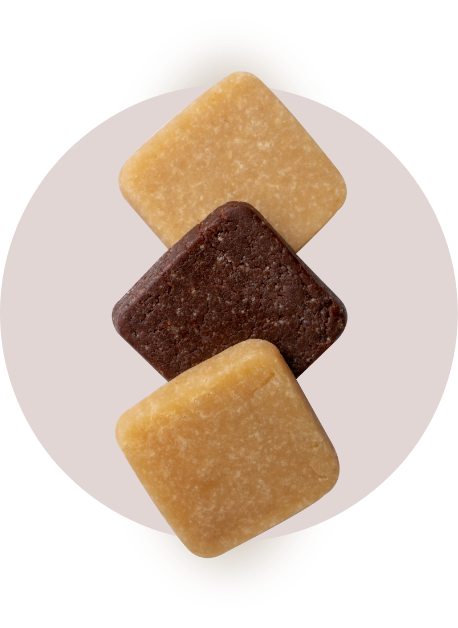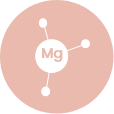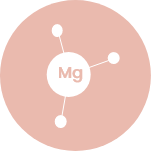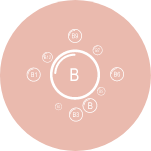Daily Nutrition and Healthy Aging Essentials You’ll Find in Each M Bite.
-

Bone
& Muscle Health*Calcium-helper nutrients like magnesium, vitamin D3 and vitamin K2 help maintain bone health. These nutrients also help keep your muscle in top shape.

Hair, Skin & Nail
Health*Biotin is a B vitamin that is important for preventing hair loss,
skin irritation, and excessive
nail breaking. -

-

Gut & Brain
Support*Fiber with prebiotic effects nourishes
the good bacteria that exist naturally
in your gut. The B vitamins have a
role in the activity of
neurotransmitters in the brain.
Energy &
Immunity Support*Vitamins B6 and B12 are essential
contributors to energy metabolism
all throughout the body. Vitamin D3
helps support normal immune
function.
Curious why we chose these nutrients and left out the rest? Read about our less is more approach.
For example, many companies sell supplements with large doses of vitamin C to “boost your immunity” and ward off that winter cold. However, the role of ascorbic acid (vitamin C) in the prevention and treatment of colds remains controversial despite many controlled trials. You are better off eating an orange. Plus, too much vitamin C in a supplement form can affect the absorption of a nutrient that many women actually need more of, vitamin B12.
Want to dive deeper into science? Here’s what each of the nutrients in our formula does!
For example, many companies sell supplements with large doses of vitamin C to “boost your immunity” and ward off that winter cold. However, the role of ascorbic acid (vitamin C) in the prevention and treatment of colds remains controversial despite many controlled trials. You are better off eating an orange. Plus, too much vitamin C in a supplement form can affect the absorption of a nutrient that many women actually need more of, vitamin B12.


Vitamin D
Helps the body to absorb calcium. Fatty fish and fortified milk supply vitamin D, but most women don't get enough.
• Vitamin D helps calcium be absorbed in the small intestine of the GI tract.
• Although extremely important for bone health for pre and menopausal women, vitamin D is only found
in some fish sources, mushrooms, and milk (NIH).
• Estrogen helps conserve bone by regulating the cells that break down bone.
• Because estrogen levels start to drop in women around the age of 45, bone mineral density (BMD) also
starts to decrease (Skelton, Mavroeidi, 2018).
Read More
5 small tweaks to your day when dealing with perimenopause
How to eat more bone-healthy nutrients

Magnesium
Supports heart, muscle and bones. Absorption decreases with age.
• Magnesium assists calcium with building bone (Castiglioni, et al., 2013)
• Research has shown a connection between bone density and magnesium levels in the blood in post
menopausal women (Orchard, 2014).
• Magnesium is a key contributor to muscle contraction (Carvil, 2010)
• Magnesium is needed to regulate calcium for cellular homeostasis (Carvil, 2010)
• In the heart, magnesium regulates electrical signals as well as inflammation and oxidation
(Severino, 2019).
Read More
How does magnesium affect heart health?
Magnesium's role in bone health

B VITAMINS
Support energy metabolism, heart, nervous system health. Intake needs to increase with age. After 50, women are advised to supplement for B12.
• Vitamin B6 helps make neurotransmitters that contribute to energy levels (Kennedy, 2016)
• Both vitamin B6 and B12 are crucial for preserving blood vessels for heart health (Alberto Calderón-Ospina and Mauricio Orlando Nava-Mesa, 2019).
• The nervous system also benefits from vitamins B6 and B12 since they improve the effects of nerve damage, pain, and motor control (Alberto Calderón-Ospina and Mauricio Orlando Nava-Mesa, 2019).
Read More
Vitamin B12 and B6 and energy. Truth or myth?

Vitamin K2
Some research shows that vitamin K2 supplementation improves bone and heart health.
• Vitamin K2 allows a hormone to fully work so that calcium can form bone (Maresz, 2015)
• A decrease in risk of cardiovascular disease has been connected with vitamin K2 related to the upkeep of blood vessels (Maresz, 2015).
Read More
How to eat more bone-healthy nutrients

FIBER
Fiber with prebiotic effects nourishes the good bacteria that exist naturally in your gut.
• Fermentable food sources for the bacteria in your gut. The “pre” in prebiotics stands for before, referring to the food that gut bacteria eat before they can do their jobs.
• Prebiotics help to diversify the bacteria in our gut (gut microbiota), and the more diverse these bacteria are, the better they positively contribute to not only digestive health but also immune health (Carlson, et al., 2018).
Read More
How to eat more bone-healthy nutrients


















